So often in literature, mothers are “characters” in the worst way—one-dimensional caricatures, punching bags for the misogyny soaking our society. Far rarer (in both lit and life) are the mothers allowed to be whole human beings. Motherhood is not easy. It’s hard, brutal, utterly exhausting and often unrewarded work. In literature, film, song, or other art, mothers are commonly reduced to a single function, either passive (often actually dead) saints or baby-eating horrors. It’s rare for a mother-character to be allowed wholeness, autonomy, or any kind of real agency.
Here are five of my favourite books in which mothers are allowed to be whole human beings.
Lady Jessica — Dune by Frank Herbert

Cleolinda Jones often advanced the theory that certain characters turn “meta”, and resonate far beyond their creator’s intent even in the text that is supposed to trammel them. (Just look at Eowyn of the Rohirrim.) There are certain characters so vivid, despite their creators’ attempts to keep them contained, the reader cannot help but sit up and take notice.
It would have been easy for Lady Jessica to be a simple cipher, an illegitimate Harkonnen, a product of the Bene Gesserit breeding program, Leto’s self-abnegating wife. (Let’s not even talk about the feudal women-as-property underpinnings that apparently will be with “civilization” when we figure out FTL travel…) Fortunately, Herbert must’ve been too busy juggling his ecological hobbyhorses to notice he’d written a woman as a complete human being.
Jessica is smart, committed, deadly in interpersonal battle, and an integral part of Leto Atreides’s rule. It’s her decision to take control of her bodily autonomy and have a son (instead of the daughter the Bene Gesserit “require”) that makes a galactic jihad and the Golden Path possible. The reason given in the text is that she wanted to give her husband a male heir, but I like to think at least some of her decision was a giant “fuck you” to those who told her what to do with her own body.
It’s Jessica whose interactions with Shadout Mapes lays the groundwork for the Atreides to be seen as different from the Harkonnens, and Jessica whose status, skills, and quick thinking make sure the Fremen don’t just kill her and her son outright. It’s Jessica who raised Paul to become Muad’Dib. She is a whole person instead of the cardboard cutout so many mothers in fiction are reduced to.
Not only that, but Jessica is committed to her children, and protects them with a fierceness that shatters an entire galactic empire. Paul and Alia both suffer from uncertainties, but neither ever doubts their mother’s love.
Much of Herbert’s writing can be ponderous in the extreme. Yet whenever Jessica is onstage she’s magnetic, the action moves along at a cracking pace, and the reader can’t look away. She’s a survivor, a mother, a grandmother, and the best thing about the Dune books.
Karrakaz — The Birthgrave Trilogy by Tanith Lee
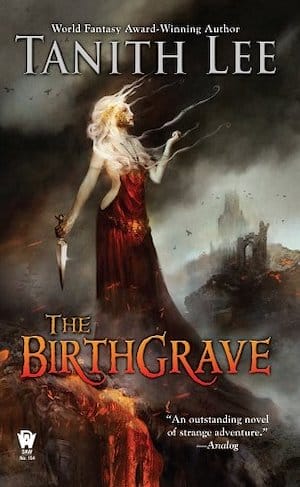
It’s no secret I’m a huge Tanith Lee fan. The gorgeous prose and arresting images are only part of the fascination; Lee’s work never shied away from shark-filled psychological depths. In the Birthgrave trilogy, Karrakaz is never reduced to “just a mother”, even in the last two books when the product of her unwilling union with an absolutely horrid, controlling psychopath of a conqueror is ostensibly the protagonist. Not only that, but Tathra—the woman Karrakaz leaves her infant son with for a variety of reasons—is a whole person as well, never degraded into the “saintly mother” trope even if she is clearly thrilled to be a mother.
Karrakaz starts from literal nothing, makes her way in a world where nearly everyone she meets wants to kill or control her, and her heroine’s journey is both classic and groundbreaking. She also wields a mean bow, carries powers beyond human imagining, and finally reaches self-understanding with the help of a psychic spaceship.
Lee did not have to go so hard as an author, but she always did. I like to think Karrakaz takes a page out of her creator’s sheer stubbornness.
The entire trilogy is laden with examinations of trauma, misogyny, women wresting bodily autonomy and agency wherever they can, and the cost of power both political and personal. Through it all, Karrakaz is a driving force even when she’s not present, and her choice to opt out of motherhood is explored unflinchingly.
Frostflower & Thorn — Frostflower and Thorn by Phyllis Ann Karr
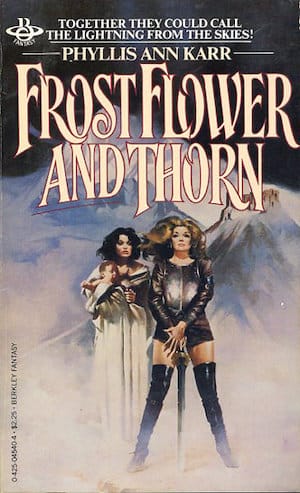
Frostflower and Thorn opens with a female mercenary figuring out she’s pregnant, and coming across a sorceress who can solve that particular problem the condition represents for a woman who must earn a living by the sword. Both Thorn (the mercenary) and Frostflower (the sorceress) are mothers; deciding to terminate a pregnancy is no less an act of motherhood than adopting a child that is not “biologically” yours.
The alliance between the two is wonderfully written. Both are allowed to be whole, entire people in their own right, even in a misogynist world where any woman’s exercise of power—by sword, sorcery, or any other means—is viewed as deeply suspect at best and an offense deserving death at worst. Thorn’s aggressiveness is presented as a natural part of her personality as well as a habit trained in by survival throughout, and Frostflower’s pacisfism is not self-abnegating sainthood but a philosophical and temperamental choice. The developing bond between two very different women with very different goals, outlooks, and personalities is wonderfully written.
Not content to simply hit an examination of motherhood out of the park, Karr also unflinchingly describes rape as what it is—a crime of power, not of sex—and does all this while also showing thorough and complete mastery of classic sword-and-sorcery tropes.
Danica — Sabazel by Lillian Stewart Carl
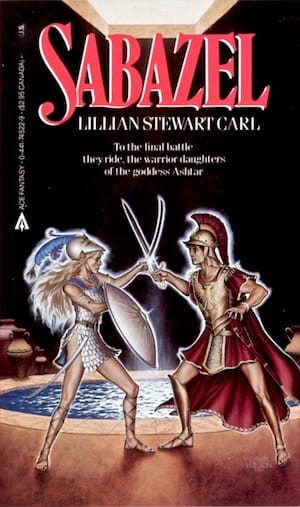
I can only describe the experience of reading Sabazel when I was about thirteen as mind-blowing. Carl’s imagining of an Amazonian society which must survive surrounded by patriarchal cultures is deeply researched, utterly riveting, and a cracking good tale to boot.
Danica, the priestess-queen of Sabazel, is one of the best female characters in literature. She is unapologetically powerful, at home on the battlefield or in the bedroom. Being a fiercely protective and loving mother to her daughter Ilanit is the least of her roles; she’s also a warrior, general, political strategist, an avatar of her beloved goddess…and, by a third of the way into the book, pregnant with a god-king’s heir. Which does not slow her down one iota.
Like Lady Jessica, Danica has complete autonomy (bodily and otherwise) despite the many attempts to rob her and her country of it. She engages with Bellasteros the conqueror on her own terms, even between the sheets, and is a full and active partner to her goddess. Like Karrakaz, she gives up a male infant to another woman (Chryseis, another wonderfully delineated mother figure) because that’s what’s best for her children, her land, and herself.
Also deserving of mention is the figure of Atalia, Danica’s weapons-master and lieutenant, who shows another aspect of mothering—intense, protective, and not needing a biological link to fill the role in another’s life.
Wendy — The Shining by Stephen King
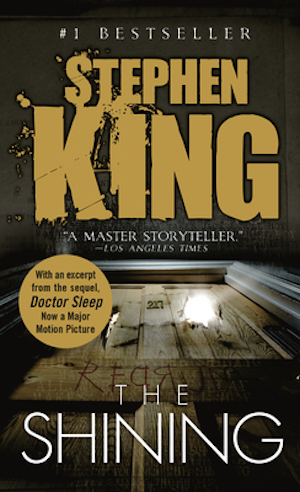
I’m a huge King fan, even when some of his female characters are paper cutouts. There are marvelous exceptions (Rose Madder springs to mind, though I’ve read in interviews that he hates that book with a passion), and first among them is Wendy Torrance.
One might be forgiven for thinking Jack is the focal character of The Shining, or Danny. For me, it’s always Wendy. It’s her influence that gives Danny a refuge from Jack’s weakness and rage, her hard work put into raising her son that gives Danny the means to resist the carnivorous Overlook, and her courage that allows both her and her son to survive long enough to escape.
Kubrick’s cruelty to Shelley Duvall during the filming of the movie version is legendary, but even in that retelling meta-Wendy’s strength and commitment shine through. Those who bleat why didn’t Wendy leave Jack when he broke Danny’s arm are simply betraying their own misogyny—escape is not often an option when one has a child, especially since our entire society conspires to turn children into abusive fathers’ hostages, psychologically, physically, and economically. It takes a great deal of strength to fight that constant, unrelenting pressure, and Wendy does it as best she can.
Wendy is never taken in by the Overlook; she isn’t seduced by its (dubious) charms, and the book to me is a battle, Jack (and the Overlook) vs. Wendy for their young son’s literal soul. Wendy wins, yes—but many mothers fall in those campaigns, and lie unremembered.
***
This list isn’t comprehensive; I could go on for days. I could also go on about bad mothers who are allowed to be portrayed as whole, independent human beings…
…but that’s (as always) another story.
Buy the Book
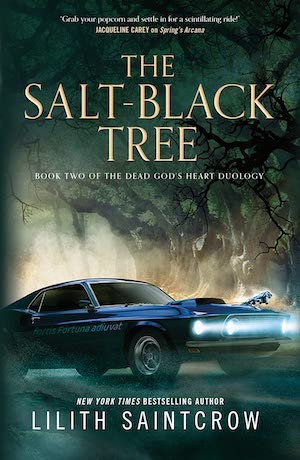

The Salt-Black Tree
Lilith Saintcrow was born in New Mexico, fell in love with writing during second grade, and has continued obsessively ever since. She currently resides in the rainy Pacific Northwest with her children, dogs, cat, and a library for wayward texts.










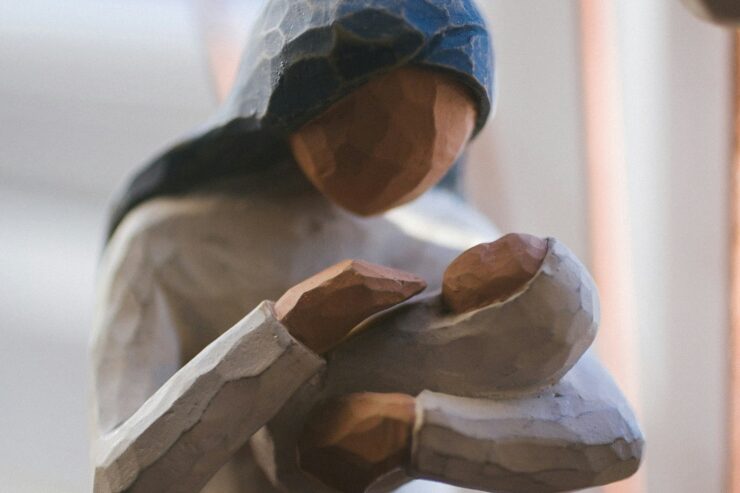

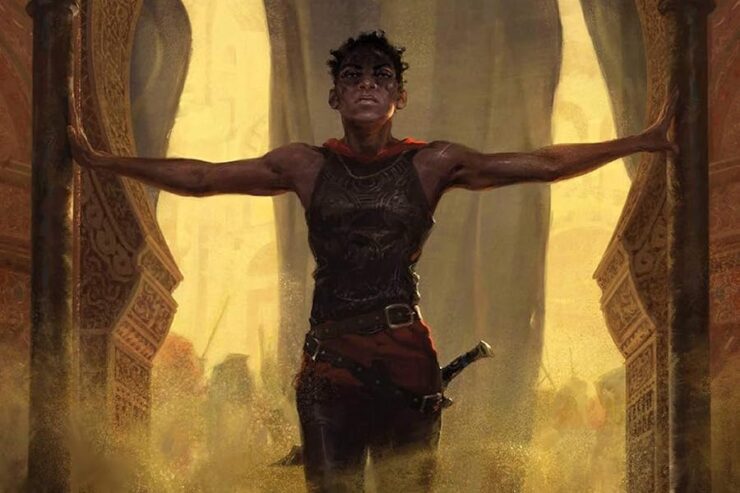
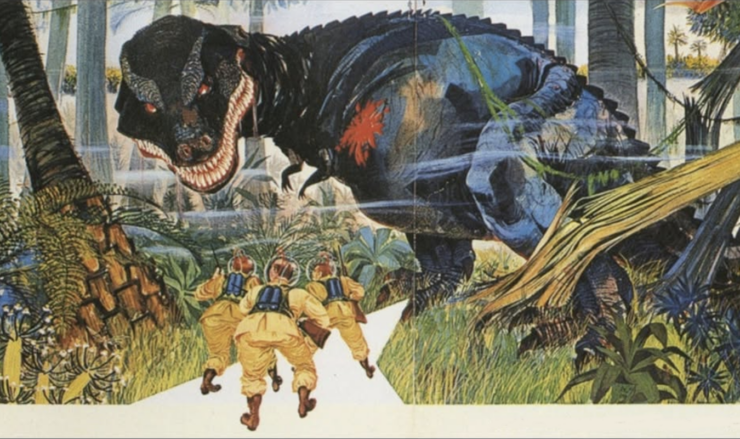

Cordelia Vorkosigan, of course.
Esther in The Keeper’s Six by Kate Elliott. Thoroughly her own person, the leader of a highly competent squad, and out to rescue her adult son.
Another interesting question: in all those examples, *being a mother* is really critical to that character’s role in the plot. Are there books in which that isn’t the case – where a character just happens to be a mother, rather than having that define her throughout the book? Lady Jessica is a great character but her role in the book is very much “being Paul’s mother”.
Nanny Ogg would fit the description, I suppose. She is a mother (and indeed a grandmother), she’s a good one as far as we can tell, we meet her children from time to time, but her part in the story is about more than just motherhood. Just as Vimes is a father but his story doesn’t exclusively revolve around fatherhood.
Any others?
KM Herkes’ The Sharp Edge of Yesterday! The main character is a mother on the run with devastation hot on her heels. She escaped a religious cult and rescued her children from her ex-husband, but fate isn’t done with her yet. She is about to hit rollover-the crisis point in middle age when latent superpowers activate-and all signs point to her developing a rare and overwhelming talent.
She is not the only Mom in this book – there are at least 4 major characters who are mothers, and each is a fully developed character. This is a great book for anyone who is sick of the “sweet mom” trope, or is sick of teenagers being the only ones who get superpowers!
The Emelan quartet, by Tamora Pierce, do not get nearly the recognition they deserve, overshadowed by Pierce’s Tortall universe. However, Rosethorn and Lark do a wonderful job of raising the four of the of the Circle, both as teachers and mothers.
@2
Ista dy Baocia’s role is principally as mother of Royesse Iselle and Royse Teidiz in Bujold’s The Curse of Chalion, but in Paladin of Souls she becomes the protagonist in her own right, and her children are barely footnotes.
The Lady Trent Memoirs series too, and is a good example of the OP in general; Isabella (later to become Lady Trent) has a son, who spends most of the books under the care of a nanny, at boarding school, apprenticed to a sea-captain, or otherwise not with her on her adventures.
@5 Lady Trent is awesome! She even comments on the challenges of being an MC, I mean a naturalist ;), and a mother. For example, when a man leaves his family to go on a research expedition, everyone talks about how brave he is and what a service he’s doing for the community, etc., but when a woman leaves her family for that same research, she’s a heartless monster who doesn’t love her children.
“She is about to hit rollover-the crisis point in middle age when latent superpowers activate”
This is a great concept. Superpowers as a midlife crisis metaphor!
@2: totally get the OP’s annoyance at the ciphering of mothers, but if a character is only incidentally a mother and their work as a mother (I use the term deliberately) has no relevance to the plot, I’m not sure it makes for a particularly informative lens to look through?A
I would nominate Kane, mother of Nepenthe, of Patricia McKilip’s “Alphabet of Thorn”, who gives up everything for her daughter, twice.
No love for Petunia Dursley or Molly Weasley?
Essun in the Broken Earth trilogy by N.K. Jemisin. The relationship between Essun and her daughter is heart-breaking.
Catherine Asaro’s Roca Skolia–first one I thought of after Cordelia Naismith Vorkosigan
Camila Noceda in the Owl House. Mothers in kids’ adventure shows are generally either oblivious to what their children are up to or want to keep their children safe (derogatory). Camila? She starts out by wanting to send Luz to a camp to learn to be “normal”, which left some of the fandom vilifying her. But this only came after Luz had brought illegal fireworks and live snakes to school, resulting in several injuries, and those who went to the camp had positive memories of it. So when we get to see more of her, it becomes clear her motive was less to “fix” her daughter than to get her to think through the consequences of her actions and dial things back enough to keep from being bullied. And when she finds out that Luz plans to never return to the Boiling Isles because she thinks that’s what her mother wants, Camila responds by grabbing a bat and saying she’s not going without her mother to back her up.
As much as I love Cordelia, I’m not sure she qualifies for the OP’s conditions. Most books after her son is born, she’s not the focus of the story anymore. Maybe in _Gentleman Jole and the Red Queen_ specifically (where she is one of the title characters).
Also +1 to Essun, the first person I thought of.
Two more that haven’t been mentioned yet are Pearl and Malachite from the Books of the Raksura series. Of course, it’s only to be expected in a matriarchal society like theirs. Doesn’t everyone’s mom rip their enemies’ heads off?
Oh, and let’s not forget Ilisidi from the _Foreigner_ series. Who doesn’t *personally* rip anyone’s head off, but you definitely wouldn’t want to be on her bad side.
8: I would say it’s fairly informative if every example of a person in literature with a particular characteristic is almost completely defined, in plot terms, by that characteristic, yes.
If I couldn’t, for example, think of a Catholic character in fiction whose role in the plot wasn’t entirely about their relationship with the Church, or a divorced character whose motives weren’t all related to their ex-spouse, that would give me pause for thought.
You can definitely create really good characters with interesting stories in both categories, of course! But if they’re the only stories anyone ever tells about that sort of character…
15: I think Cordelia counts. The OP just says “books in which mothers are allowed to be whole human beings”. They don’t have to be the protagonist and in fact one of the examples given, Lady Jessica, definitely isn’t.
@16:I think what I’m really wondering is – if it’s that peripheral to their role in the plot, would you even know? Galadriel in LOTR meets your criterion (though one might argue about how rounded a character she is) but you could easily miss the references to Celebrian being her daughter in the text andit wouldn’t really change your perception of the plot.
This may be nitpicking, but Duke Leto never married Lady Jessica. She had the status but never the legal title of wife; iirc, it was something to do with leaving him free to secure an advantageous marriage, should the opportunity arise.
I think what I’m really wondering is – if it’s that peripheral to their role in the plot, would you even know?
Well, that’s where good character-building comes in! A well-portrayed character is going to have a lot of attributes that are not central to their role in the plot, but that make them more plausible (because they’re more ‘filled out’), or that provide insight into their personality.
Think Nero Wolfe and his orchids. I don’t think there’s a single story in which orchid knowledge is actually plot-important. But it builds Wolfe as a character and it fits with the rest of his personality.
I’ve often been dismayed at how mothers are portrayed in nearly all genres; they’re damned if they do and damned if they don’t. So this article was encouraging to read. Hello from Vancouver – I’ve enjoyed many of your books.